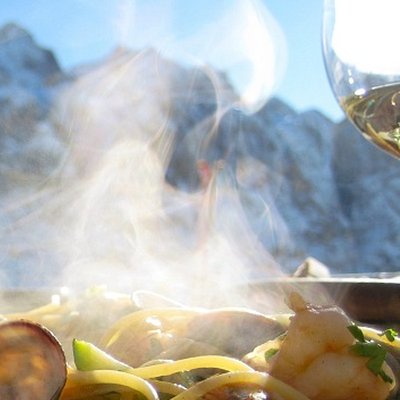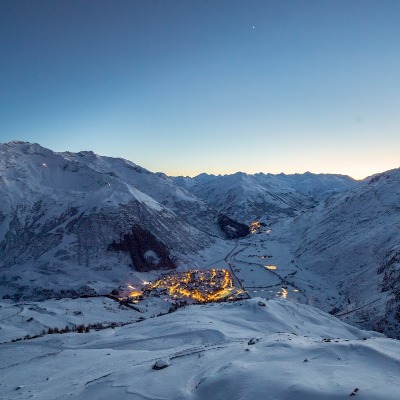Odermatt Wins GS Crystal Globe, Eighth Win In A Row

Odermatt has won 11 World Cup giant slalom races in a row. Nothing can stop Marco Odermatt (SUI) winning on giant slalom skis right now. Not a hugely challenging piste. Not a pair of resurgent rivals. Not even an almost empty ‘battery’.
Defying all the above, the Swiss megastar won in Aspen, USA on Friday evening recording a combined time of two minutes 07.87 seconds to make it a perfect eight victories in eight Audi FIS World Cup GS races this season. A spotless record that gives him a third GS Crystal Globe in a row and sets him on the path to break yet more records.
Both Loic Meillard (SUI) and Atle Lie McGrath (NOR) produced their best performances of the season – to finish second and third respectively – but even PBs are not good enough to better Odermatt these days.
No one has beaten the 26-year-old in a World Cup GS race for more than a year. This 11-strong-streak pulls him level with the great Annemarie Moser-Proell (AUT), who claimed 11 consecutive downhill victories from 1972-74.
But perhaps even more remarkable is the fact that since the start of last season Odermatt has finished on the podium in 41 of his 48 World Cup starts, winning 25 times.
The numbers go on – Odermatt is on course to destroy the all-time points record he set last season – and make it all sound easy. But the man himself insists the reality is very different.
“It was probably the hardest day of the season,” said Odermatt who led the field by 0.12 seconds after run one and 0.14 seconds at the end. “It was so tough, I don’t know why, probably the altitude and the warm temperature. It was very tough. I didn’t feel good at the start, everything was so slow, not much energy.”
Clearly battling fatigue, there were rare mistakes throughout a somewhat scrappy second run down a fast, demanding set. But no one knows better how to win.
“It takes so much energy to always get into this race mood, into this focus. It’s really not easy. Right now it looks like (its) easy but it’s definitely not,” Odermatt said. “Each run is so much work for the mental part. Happy that I still had enough energy to win.”
A 36th career World Cup win pulls him level with fellow greats Benni Raich (AUT) and Aksel Lund Svindal (NOR). But even more alluring, is the prospect of going through the season unbeaten in his favourite discipline.
“For sure, when you have won eight of eight then (you think about it), it would be amazing,” Odermatt smiled, before turning his attention to an exhausting prospect. “But even for tomorrow (the next World Cup GS), I am not sure how high the battery level will get during the night. But hopefully enough to fight again for the victory.”
Fellow all-rounder Meillard may be quietly hoping his exalted teammate is still exhausted. A super-G podium in January, a slalom podium in February and now a GS podium in March, he is another all-round Swiss maestro.
“It feels amazing. GS has been tough. A lot of lows, more lows than highs actually. So to come back on the podium, it’s great,” said the man who had yet to step on a GS podium this season before arriving in Aspen.
Best of all, he understands what he needs to do to go one higher on Saturday.
“I know where I lost it,” he said. “It wasn’t great the last banana for the last part. It’s on me I can’t say any different but at least I know that I can be faster than him (Odermatt) and that’s important.”
For McGrath the emotions of finally being back on a GS podium were almost too much.
“Once I realised I was on the podium, which was unfortunately was when Zander (Alexander Steen Olsen NOR – second after run one) came down, I just started to cry,” said the Norwegian who has long been struggling to get back to his best and suffered several heavy falls in the past month.
“I couldn’t stop it because there’s been so many things going on these past three years. It was kind of a full circle moment.
“It’s been very tough for me in GS with a lot of injuries and GS is a tough event and you have to risk it a lot and I maybe haven’t always been in a good position to risk it.”
For the Americans, River Radamus skied to an 11th place position.
“I felt like I executed well today,” said Radamus. “Second run the approach was much better with a better touch on the snow.”
The weather could not be more perfect with beautiful sunny skies and a fired-up Colorado crowd, but it was a bit of an unusual giant slalom on the results sheet with more than 25 skiers not making it to the bottom of the course. The hill was more aggressive and icy than many expected, coupled with a very tricky course set. Radamus was cooking the top splits on his first run until he got extremely late before the flat section, losing all his speed. He made another large mistake toward the middle, bumping him to a 15th place first run.
“Today was a learning curve for everyone. It was icy up top and on those crucial turns they got pretty polished,” said Radamus. “I made some more mistakes in the second run but I was pushing really hard so I am happy with the second run for sure.”
On the second run, the snow was still very aggressive and Radamus chose to switch up his equipment. He skied well the whole run, with the exception of a few mistakes, ultimately moving up four places to 11th overall for the day.
Stifel U.S. Ski Team athletes George Steffey, Brian McLaughlin, Tommy Ford and Isaiah Nelson were all in top 30 contention on the first run but, like many of their competitors, got late and low, blowing out in the middle of the run. Patrick Kenney finished the first run in 37th, not good enough for a second run.
“Our whole team has the speed right now. I think they wanted to put something down special and laid everything on the line and sometimes you go out. But they can do it,” said Radamus.













